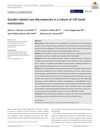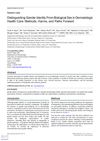 4 citations,
June 2018 in “PLOS ONE”
4 citations,
June 2018 in “PLOS ONE” Iron levels are linked to insulin resistance in men and postmenopausal women, but not in premenopausal women.
 4 citations,
February 2015 in “Journal of Clinical Laboratory Analysis”
4 citations,
February 2015 in “Journal of Clinical Laboratory Analysis” A genetic variant in the androgen receptor gene increases heart disease risk in women but not in men.
 3 citations,
April 2019 in “Journal of Cosmetic Dermatology”
3 citations,
April 2019 in “Journal of Cosmetic Dermatology” Women's facial moisturizers cost more per ounce than men's.
 1 citations,
October 2022 in “PubMed”
1 citations,
October 2022 in “PubMed” Gender affects wool traits in sheep, with males and females showing differences in skin proteins related to wool growth.
 1 citations,
April 2022 in “Emergency Medicine Australasia”
1 citations,
April 2022 in “Emergency Medicine Australasia” The document concludes that respectful, gender-affirming healthcare improves mental health and encourages continued medical care for transgender and non-binary individuals.
 October 2024 in “Journal of the Endocrine Society”
October 2024 in “Journal of the Endocrine Society” Feminizing hormone therapy increases kidney filtration rate.
 October 2024 in “Journal of the Endocrine Society”
October 2024 in “Journal of the Endocrine Society” Gender-affirming hormone therapy affects metabolism differently based on treatment type.
 January 2024 in “JEADV clinical practice”
January 2024 in “JEADV clinical practice” Gender-affirming dermatology treatments generally improve mental well-being for transgender individuals, but more research is needed.
 September 2023 in “Journal of The American Academy of Dermatology”
September 2023 in “Journal of The American Academy of Dermatology” Hormone therapy in transgender and gender diverse individuals affects hair loss differently than in cisgender individuals.
 June 2023 in “Facial Plastic Surgery Clinics of North America”
June 2023 in “Facial Plastic Surgery Clinics of North America” Hair transplantation is important for transgender patients to enhance their masculine or feminine appearance.
 June 2023 in “JMIR dermatology”
June 2023 in “JMIR dermatology” The conclusion is that recognizing the difference between gender identity and biological sex is crucial in dermatology to improve patient care and research accuracy.
 May 2023 in “Journal of drugs in dermatology”
May 2023 in “Journal of drugs in dermatology” Most transgender patients getting laser hair removal before gender-affirming surgery are already on hormone therapy, which might affect the hair removal process.
 January 2023 in “Operative Techniques in Otolaryngology-Head and Neck Surgery”
January 2023 in “Operative Techniques in Otolaryngology-Head and Neck Surgery” Hair transplants help transgender patients look more like their gender identity, with different procedures for trans women and men.
 April 2022 in “Zbornik radova Pravnog fakulteta u Splitu”
April 2022 in “Zbornik radova Pravnog fakulteta u Splitu” The conclusion is that sex-verification in sports was harmful and changes have been made to address this.
 November 2021 in “World Family Medicine Journal /Middle East Journal of Family Medicine”
November 2021 in “World Family Medicine Journal /Middle East Journal of Family Medicine” Men and women with diabetes in Jeddah, Saudi Arabia, experience different symptoms and complications.
April 2019 in “Journal of the Endocrine Society” Care for gender-dysphoric Veterans can be improved with a consistent, team-based approach.
 January 2018 in “Springer eBooks”
January 2018 in “Springer eBooks” Gender affects hair and scalp characteristics, with differences in hormone responses, graying patterns, and trace metals.
 January 2018 in “Springer eBooks”
January 2018 in “Springer eBooks” Men and women need different facial rejuvenation treatments due to distinct aging processes and anatomical differences.
 January 2018 in “Georg Thieme Verlag eBooks”
January 2018 in “Georg Thieme Verlag eBooks” Gender affirmation surgery improves personal appearance and self-esteem.
 September 2014 in “Springer eBooks”
September 2014 in “Springer eBooks” Men and women experience skin aging differently due to changes in sex hormone levels with age.
 June 2007 in “Expert Review of Dermatology”
June 2007 in “Expert Review of Dermatology” Men and women may have different risks of getting skin cancer.
February 2023 in “Journal of The American Academy of Dermatology” Transgender patients on masculinizing hormones have higher hair loss rates than cisgender women.
33 citations,
May 2016 in “Translational andrology and urology” Laser hair removal before genital surgery can prevent complications and improve patient satisfaction.
16 citations,
February 2014 in “Iranian Red Crescent Medical Journal” Polycystic Ovary Syndrome (PCOS) affects Iranian women's feelings of femininity and self-image.
8 citations,
November 2023 in “Social Science & Medicine” Gendered social factors, not just biology, contribute to sex differences in adverse drug events.

Accurate gender and sex assessment in dermatology is essential for respectful and precise patient care.
 125 citations,
August 2020 in “Frontiers in Immunology”
125 citations,
August 2020 in “Frontiers in Immunology” Men generally have more severe COVID-19 cases and higher death rates than women due to biological differences.
 36 citations,
November 2009 in “Journal of Investigative Dermatology”
36 citations,
November 2009 in “Journal of Investigative Dermatology” Prolactin may affect hair growth differently based on gender and scalp area.
 12 citations,
November 2018 in “JAMA Dermatology”
12 citations,
November 2018 in “JAMA Dermatology” Collecting sexual orientation and gender identity data in dermatology can lead to better, more sensitive care for sexual and gender minority patients.
 11 citations,
May 2021 in “Journal of Medical Virology”
11 citations,
May 2021 in “Journal of Medical Virology” Men are more likely to have severe respiratory viral infections like COVID-19 due to hormonal and genetic differences, while women generally have stronger immune responses.
























